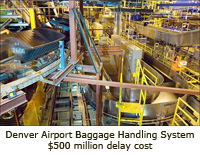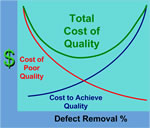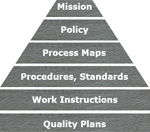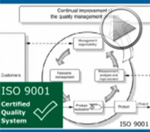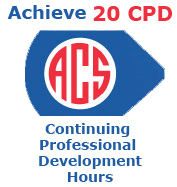| SOFTWARE IN PRACTICE |
|

Managing Systems & Software Quality in 2017
Benefits:
Who Should Attend
Workshop OutlinePart 1: Software Quality Fundamentals
Part 2: Quality Management Processes
Part 3: Implementing the Quality System
|
Meet the Workshop Leader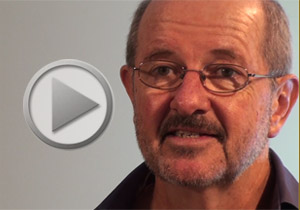
Related talksThe Quality Management Framework Architecting a Quality Management System Highly RatedThis workshop is Australia’s most mature and well received software quality programme having been presented to over 1000 participants from 250 public and private sector organizations since 1991. In-house PresentationsIf you have a critical mass of people with this training need it may be more cost effective to run this workshop in-house. Our in-house presentations may be tailored for individual needs or presented in the standard format. For more information Email us or call Les Chambers on +61 7 38704199. Participant ReactionThis workshop has saved me 6 months work in putting my quality manual together! Of greatest value was the sample checklist with specific areas of applicability, and being able to relate quality standards to improved quality products through examples and case studies. Good basis to move ahead. Case studies were excellent. Overall value for money. I found the workshop very valuable and meaningful in spite of the fact that a good portion of the language was new and I lacked personal experience in this area. Thoroughly enjoyed it. In addition to satisfying my objectives, I received a useful refresher on systems development practice. I go away with a better idea of how to approach the daunting task of educating our staff on the need for and use of ISO 9001. I particularly enjoyed and gained a lot from the audit workshop. Thanks for a very interesting week. At long last an exposition of a methodology that creates an environment which draws together numerous good work practices etc for its development and management. I enjoyed this workshop as much as any I have attended in a long time. Would appreciate a similar seminar on Project Management. Brings together many subjects that I had "touched-on" in the past but needed more information especially Software Engineering. I expect this information will be more and more useful to me in the future. Especially appreciate the ‘real-life’ examples of the materials and would encourage more of this. Useful introduction to the topic with sufficient information and direction to subsequently develop own SQMS. Vitally important topic for Australian IT industry. Course well presented and message will be taken away by all attendees to their benefit and that of their employees. Answered my specific needs re implementing ISO 9001. Knowledge of ISO 9001 very useful. It is of great importance that the Presenter knows what he is talking about - Les is that kind of person. Overall I found the course extremely worthwhile and will be putting it into practice next week onwards. Enjoyed the course; it truly helped me come to terms with ISO 9001. The course was given by someone who has particular experience. Well worth the time; will save me a lot of time and effort over the next 18 months. This was the best course I have attended for several years; I guess because of Les’ personal involvement with the subject and clear organization of material. Thanks. Has given me an excellent starting point for setting up our own software quality management system. I aim to start next week. The workshop was very professionally run and presented. The workshop has been very useful as it has allowed me to identify the areas in our organization which need to be attacked first. Past Workshop AttendeesWorkCover New South Wales,Telstra, AMP Society, American Express TRS Technologies, Australian Army, Royal Australian Navy, RAAF HQ Logistics Command, Citibank, Fujitsu Australia , GIO Australia, NSW TAB, NSW Police Service, NSW Public Works Department, Software Associates, Westpac, Computer Power Group, Department of Community Services & Health, Australian Tax Office, University of Canberra, Department of Social Security, Gas and Fuel Corporation of Victoria, SPL, Vic State Insurance Office, Department of Defence, Australian Eagle Insurance, Oracle Corp, SEQEB, Antarctic Division, CITEC, QLD Department of Education, Runge Mining, Australian Submarine Corp Presenter ProfileBackground. Les Chambers is a practising professional software engineer with extensive international experience in developing real time and commercial data management systems. In the context of assignments in the U.S.A., Asia, the Middle East and Australia he has performed the sum of all tasks required to construct a software and electronic system; from project manager, safety authority, quality manager, configuration manager to requirements engineer, V&V engineer, design authority, system architect, controls engineer, software developer and hardware designer. Les is principal of Chambers & Associates Pty Ltd, a Brisbane based systems and software engineering, training and consulting practice he founded in 1988. Les works in Australia and internationally with clients in the industry sectors of railway and road transportation, telecommunications, defence, gaming, government, manufacturing and control systems. His clients have included Telstra, Honeywell, Siemens, Boeing, Royal Australian Air Force, Jupiters Casino Group, Invensys, Ansaldo and Rockwell. Quality Management Experience. Les' views on software quality spring from his experiences as both a working quality manager on large projects and as a quality consultant responsible for providing advice on implementing software quality management systems. As a consultant he assists organisations in developing and improving software and systems engineering processes. Training Skills. As a trainer Les' international experience in the nuts and bolts of developing reliable software provides a wealth of case studies. His workshops are consistently rated highly for his mastery of the subject and his ability to entertain and motivate the listener. Education. Les holds a Bachelor of Electrical Engineering Honours Degree from Queensland University and has completed quality management system assessor training with Standards Australia. |
